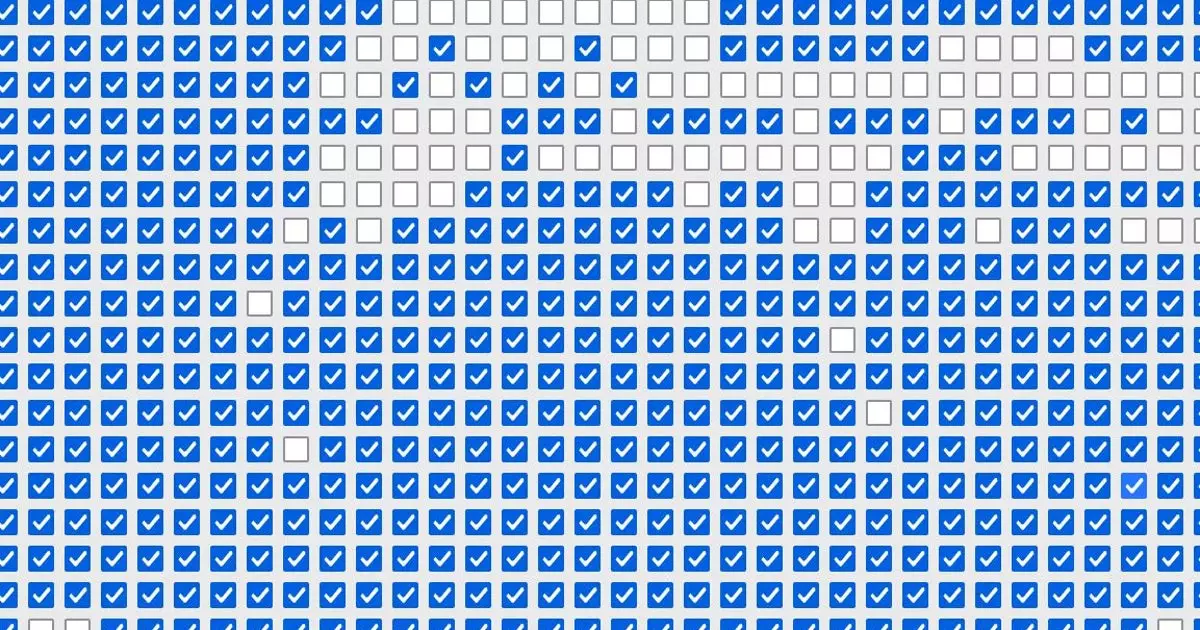In June 2023, a unique digital experiment emerged, captivating the internet community with its deceptively simple premise. One Million Checkboxes, developed by programmer Nolen Royalty, was a web platform featuring one million interactive checkboxes that users could either check or uncheck. This seemingly innocuous activity quickly spiraled into a chaotic playground of creativity and competition. In just two weeks, the site drew in an astonishing half a million visitors who collectively recorded over 650 million interactions.
As players engaged with this endless sea of checkboxes, a deeper layer of interaction developed—a struggle not only to fill the boxes but to undo and outmaneuver the contributions of other players. What began as a harmless pastime quickly morphed into a complex web of coded messages and symbolic expressions, raising questions about the nature of competition and collaboration in digital spaces.
At its core, each checkbox on the One Million Checkboxes website represented a binary choice—the essence of a bit in computing, either marked as checked (1) or unchecked (0). The interplay of these checks gave rise to an unexpected phenomenon; some players exploited this binary nature to encode messages in a method reminiscent of early computer programming. The result was an intricate tapestry of digital communication.
Nolen Royalty, the site’s creator, faced a dilemma—how to prevent the emergence of offensive or harmful messages that could tarnish the platform’s innocent allure. His innovative solution involved a dynamic scaling of the checkbox grid, ensuring that any message crafted could only be seen effectively on screens of precisely matching dimensions. This ingenious design choice not only minimized the proliferation of undesirable content but also fundamentally altered the nature of interaction. A message crafted on a tablet might become entirely invisible on a desktop, thereby fostering a sense of ephemeral creativity.
The technical aspect of the one-million checkbox game cannot be understated. After enhancing the backend system to accommodate heavy user traffic, Royalty decided to whimsically convert the checkbox data into ASCII. However, this decision led to an unexpected outcome: phenomena described as ‘gibberish’ transformed into coherent web URLs. The realization that players were crafting hidden messages through a bot-driven binary process raised complications for Royalty as he initially feared a cyber-attack.
Instead of malicious intent, this revelation highlighted an interesting aspect of digital community-building. Some players had managed to connect through these coded communications, thus establishing a Discord server aptly named “Checking Boxes.” The spontaneous formation of online social circles illustrated how digital interactions can manifest as intricate networks of collaboration, sometimes leading to unexpectedly harmonious outcomes.
As the chaos continued, the unexpected sense of community that blossomed amidst the digital chaos was remarkable. With a handful of members initially present on the Discord server, the community quickly swelled in number, attracting like-minded individuals who relished both the mischief and creativity associated with the project. The social dynamics that unfolded not only provided an emotional connection among players but also illustrated a resurgence of collaborative spirit in gaming and internet culture.
Nolen Royalty eloquently captured the essence of this experience, reflecting on his own formative years in a digitally formative era. The excitement he felt witnessing the creativity of these young coders echoed the encouragement he had received in his youth. This generational cycle of inspiration underscored the lasting impact that such playful, exploratory activities can have on individuals who later evolve into seasoned creators.
While some participants vented their frustrations about bots and competitive gaming norms, it is crucial to shift the narrative toward the innovative potential of such tools. Royalty’s project revived a spirit reminiscent of early internet culture—the playful experimentation that encourages users to break boundaries and embrace the whimsical nature of digital interaction.
The factors contributing to this creative explosion at One Million Checkboxes highlight how communities can harness collective action toward artistic expression while producing fascinating cultural artifacts. From binary messages to animated memes and even QR codes, the diverse outputs of players underscore the limitless creativity embedded within the digital age—always teetering between chaos and cooperation.
In the end, projects like One Million Checkboxes serve as a testament to the ingenuity and spirit within online communities today. As they’re often misunderstood or dismissed, the playful mischief found amongst the chaos illuminates a truth: the “misfits” and “troublemakers” of today hold the potential to shape the digital games of tomorrow. It raises an optimistic viewpoint—a belief that the internet can still foster enjoyment, creativity, and learning, despite the challenges it faces. The legacy of One Million Checkboxes is one of resilience, collaboration, and, most importantly, the joy of creating something entirely new from a sea of checkboxes.


Leave a Reply